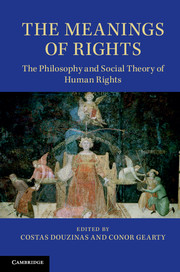Book contents
- Frontmatter
- Contents
- Notes on contributors
- Introduction
- Part I Finding foundations
- Part II Law, rights and revolution
- Part III Rights, justice, politics
- 9 From “human rights” to “life rights”
- 10 Democracy, human rights and cosmopolitanism: an agonistic approach
- 11 Plural cosmopolitanisms and the origins of human rights
- Part IV Rights and power
- Index
- References
9 - From “human rights” to “life rights”
Published online by Cambridge University Press: 05 June 2014
- Frontmatter
- Contents
- Notes on contributors
- Introduction
- Part I Finding foundations
- Part II Law, rights and revolution
- Part III Rights, justice, politics
- 9 From “human rights” to “life rights”
- 10 Democracy, human rights and cosmopolitanism: an agonistic approach
- 11 Plural cosmopolitanisms and the origins of human rights
- Part IV Rights and power
- Index
- References
Summary
The limits of the “Declaration of Rights of Man and of the Citizen” and the “Universal Declaration of Human Rights”
The 500 years of “rights” (from Rights of the People, to the Rights of Man and of the Citizen to the Universal Declaration of Human Rights) is a history entrenched in the imaginary of western modernity. It is, in other words, only half of the story. The other half is the history of coloniality, the darker side of modernity. I have made this argument elsewhere. Here I will focus on the future more than on the past. The strong thesis is that the Universal Declaration of Human Rights was not only a Euro-American and North Atlantic invention, it was an invention to correct the errors and mistakes of a handful of Western European states and the United States. I quote:
On September 28, 1948, Eleanor Roosevelt, former First Lady and delegate of the United Nations, delivered a speech entitled, “The Struggle for Human Rights.” This speech was delivered at the Sorbonne in Paris, to an audience of thousands of French citizens and delegates of the United Nations. “The Struggle for Human Rights” dealt with the struggle toward universal acceptance of human rights from those states that were considered, by the United Nations and Roosevelt, non-compliant. Those non-compliant states consisted of the USSR, Yugoslavia, Ukraine, Byelorussia, and other member states who had refused to accept the Universal Declaration of Human Rights, thus denying every human being fundamental rights and freedoms. This declaration was written with the intent to unify all nations through common terms and principles surrounding the issues of human rights and freedoms. Roosevelt felt that she must persuade those non-compliant countries to come to an understanding of the fundamental principles agreed upon by the United Nations through the means of establishing unification with her democratic audience.
- Type
- Chapter
- Information
- The Meanings of RightsThe Philosophy and Social Theory of Human Rights, pp. 161 - 180Publisher: Cambridge University PressPrint publication year: 2014
References
- 8
- Cited by



